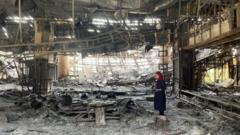Life in Tehran is slowly returning to normal, yet the shadows of recent violence linger as residents express anxiety and a desire for change. While businesses reopen and concerts fill the air, the echoes of conflict and the call for greater freedoms dominate conversations among the city's populace.
Tehran's Resilience Amidst Turmoil: Citizens Yearn for Peace and Change

Tehran's Resilience Amidst Turmoil: Citizens Yearn for Peace and Change
As Tehran's streets begin to bustle again, its residents grapple with deep fears and hopes for improved relations amid the fallout from recent conflicts.
In the heart of Tehran, the Boof café stands as a symbol of resilience amidst trauma. Once a site of political tension, it now serves chilled drinks to an eclectic mix of patrons, hinting at a society yearning for peace. Amir, a barista, reflects, "US sanctions hurt our businesses and make it hard for us to travel abroad," encapsulating the frustrations felt by many as they navigate the ongoing complexity of U.S.-Iran relations.
Inside the café, camaraderie flourishes among patrons, juxtaposed against the lingering shadows of past conflicts. One customer, draped in a long black veil, sits near another in jeans, both representing the diverse and evolving fabric of Iranian society, even as fears about the future create an undercurrent of anxiety.
Ayatollah Ali Khamenei, Iran's supreme leader, recently addressed the nation amidst mounting tensions with Israel, reaffirming his staunch opposition to U.S. policies and depicting Israel as an aggressor. His rhetoric, delivered shortly after an Israeli missile strike devastated the IRIB state TV building, highlights the fragility of Iran's standing in the region and the apprehensions rippling through its cities.
In a nearby hospital, nurse Ashraf Barghi shares her trauma from treating the casualties of the conflict. "The injuries were the worst I've treated in my 32 years as a nurse," she exclaims, capturing the visceral toll on healthcare workers like her, who bear witness to the human cost of war.
As normalcy tentatively returns, with traffic filling the thoroughfares and shops reopening, stories of heartbreak permeate the atmosphere. Teenage Mina laments the lost opportunities, "We tried so hard to have a better life, but we can't see any future these days,” she cries at the foot of Tehran's iconic Azadi tower.
Amidst a backdrop of patriotic songs performed at an outdoor concert, individuals across the political spectrum unite, voicing their collective desire for greater freedoms and reform. "They have to hear what people say," insists Ali Reza, underscoring the urgency for governmental introspection and change.
Despite oppressive restrictions on media and expression, voices emerge from the shadows, revealing a subdued yet persistent desire for transparency and dialogue. As Tehran grapples with the scars of conflict, the spirit of its people shines through, driven by a vision for a more hopeful and liberated future.




















